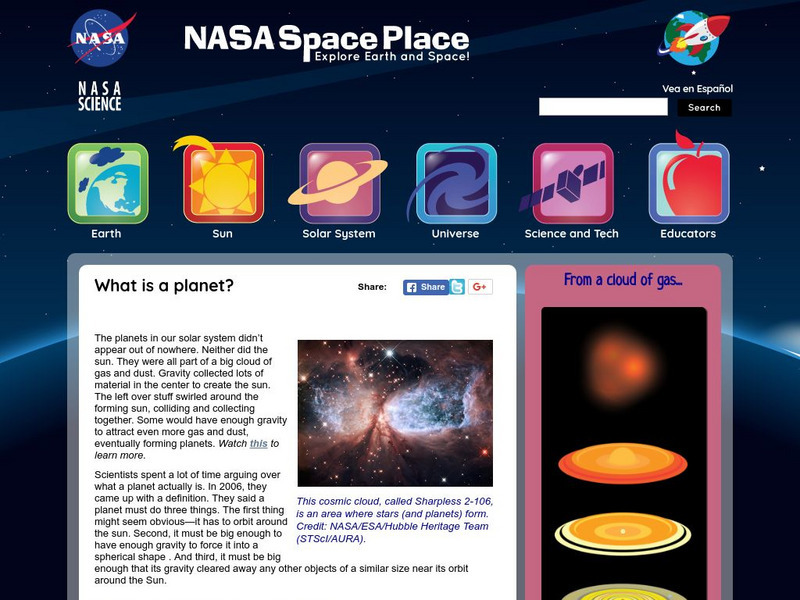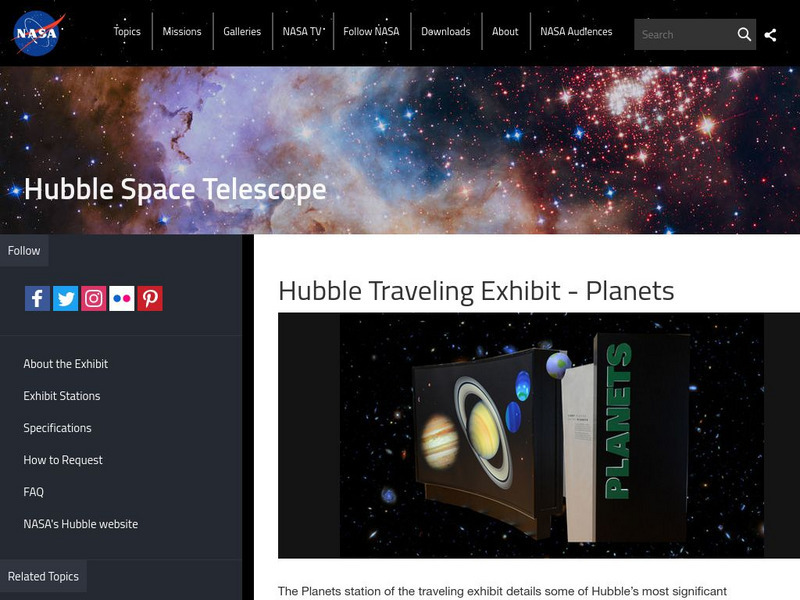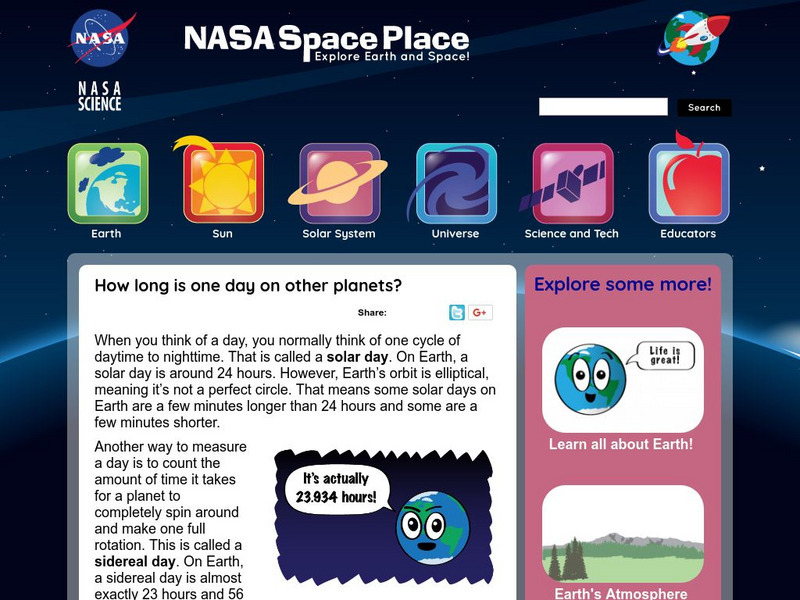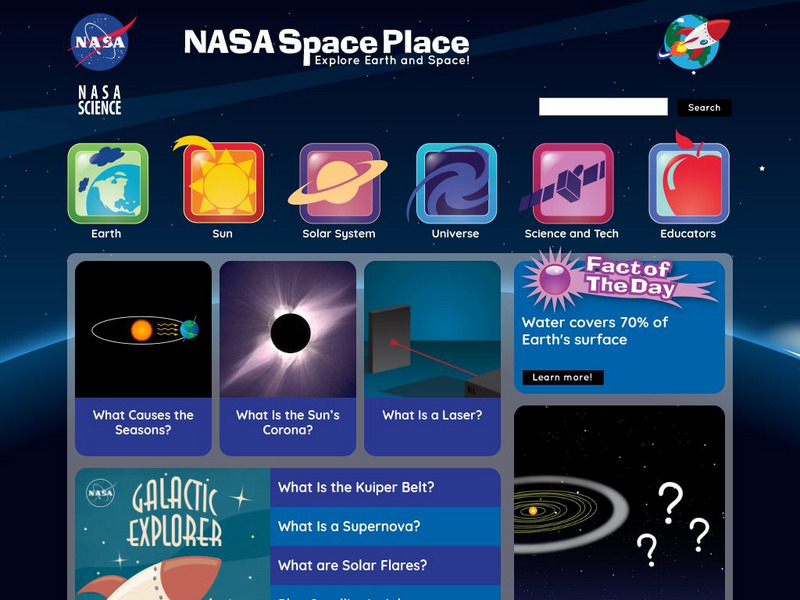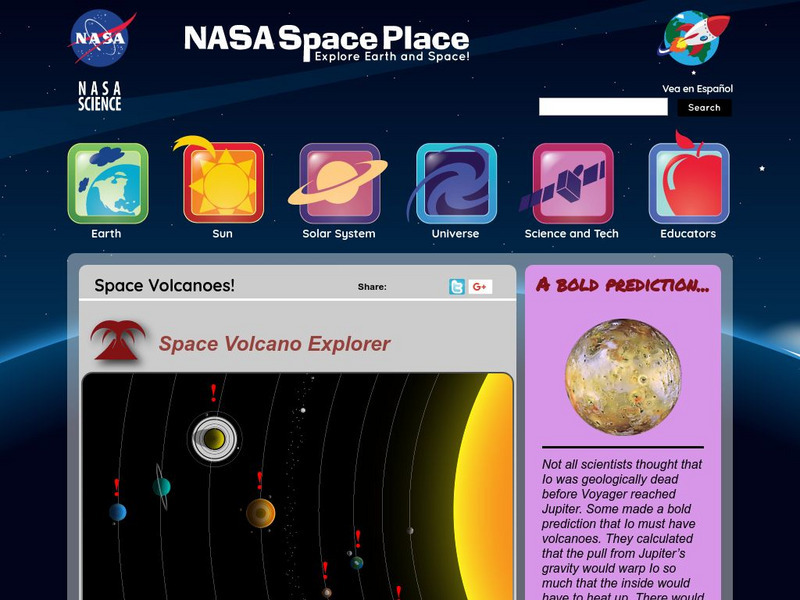NASA
Nasa: Discovery Mission: Messenger
The MESSENGER (MErcury: Surface, Space ENvironment, GEochemistry and Ranging) mission is a scientific investigation of the planet Mercury. This site provides information about its mission objectives and management.
NASA
Nasa Space Place: All About Mercury
Students have an opportunity to learn more about Mercury. Each badge contains a student centered experience to understand another aspect of the planet.
NASA
Nasa Star Child: Space Probes to Venus
A brief discussion of the space probes that have reached the planet Venus.
NASA
Nasa: Follow Curiosity's Descent to Mars
The Curiosity rover set out to answer the question: Did Mars ever have the right environmental conditions to support small life forms called microbes? The Curiosity Mars Descent Imager (MARDI) captured the rover's descent to the surface...
NASA
Nasa: Mars Exploration Rover Mission: Animation
This series of animations will take you from Earth to the Red Planet in less than ten minutes. The animation series begins with the initial launch and journey through the Earth's atmosphere. Entry into Mars, its landing and exploration...
NASA
Nasa: Solar System
This resource provides a general overview of all the planets in the solar system, as well as the sun, various comets and asteroids, the deep space network, and the latest solar system news.
PBS
Pbs Learning Media: Precipitation on the Planet
Precipitation affects many aspects of our lives, from drinking water and food to devastating rain or snow storms. NASA gathered information from satellites to study factors that influence precipitation. View these narrated and unnarrated...
NASA
Nasa: Planetary Data Sytem: Welcome to the Planets
Collection of images, with vocalized explanatory captions, of the planets acquired by NASA as part of its exploratory space programs.
NASA
Nasa: Space Place: Messenger: Planet Mass Comparison
Compare the masses of planets in this interactive animation. Simply pile a number of Earths on one side of the scale, to balance with the mass of one Jupiter. Then try this with all the planets.
NASA
Nasa: Space Place: What Is a Planet?
Explore our solar system's planets- more specifically what planets are made of, and how they are formed.
Space Telescope Science Institute
Nasa: Hubble Traveling Exhibit: Planets
At this site from HubbleSite you can learn everything you wanted to know about planets like what is the weather on Mars, what is the black eye on Jupiter? Site also provides links to information on the telescope, the rest of the planets,...
NASA
Nasa: Hubble Finds 16 Exoplanet Candidates
In the past, extrasolar planets have either been too far away to detect or conditions did not allow them to be seen. Hubble has made this possible and has determined that planets are as abundant in other areas of the milky way as they...
NASA
Nasa: Mission Science: What Is a Planet?
Find out about how planets have been classified historically, and what scientists use to study them.
NASA
Nasa: Space Place: How Long Is One Day on Other Planets?
Here on Earth a day takes 24 hours. How long are days on other planets in our solar system? Find out here in three different ways, whichever meets your learning style the best.
NASA
Nasa: The Space Place
This site from the National Aeronautics and Space Administration allows students to explore topics related to planet earth and outer space. A number of games and interactive features are available.
NASA
Nasa Science: For Kids: Solar System Fun
Test your knowledge about the solar system with games and activities designed to help explore what you know about the sun, the planets and their moons, space rocks, the Milky Way, and related topics.
NASA
Nasa: Space Place: Space Volcanoes!
Click and explore the solar system to discover where volcanoes can be found, on planets and moons.
NASA
Nasa Space Place: All About Jupiter
Discover interesting facts about Jupiter, the biggest planet in our solar system.
NASA
Nasa Space Place: All About Neptune
Learn fascinating facts about Neptune, the last of the planets in our solar system.
NASA
Nasa Space Place: All About Uranus
Discover interesting facts about the planet Uranus and what it looks like.
PBS
Pbs Learning Media: The Planets of the Solar System
As technology has advanced, so do our views and understanding of the solar system. No longer do we have to rely on our unaided eyes to observe planets. View these high-quality images of planets provided by NASA spacecraft.
NASA
Nasa: Stardust
This site provides information regarding the NASA mission to understand and protect our planet.
NASA
Nasa: Starlight Riddle
This site from NASA provides an interestinnng approach to telescopes. "Almost all telescopes nowadays use mirrors, not lenses, to gather and focus the light from celestial objects. We have just seen, though, that mirrors reverse the...








